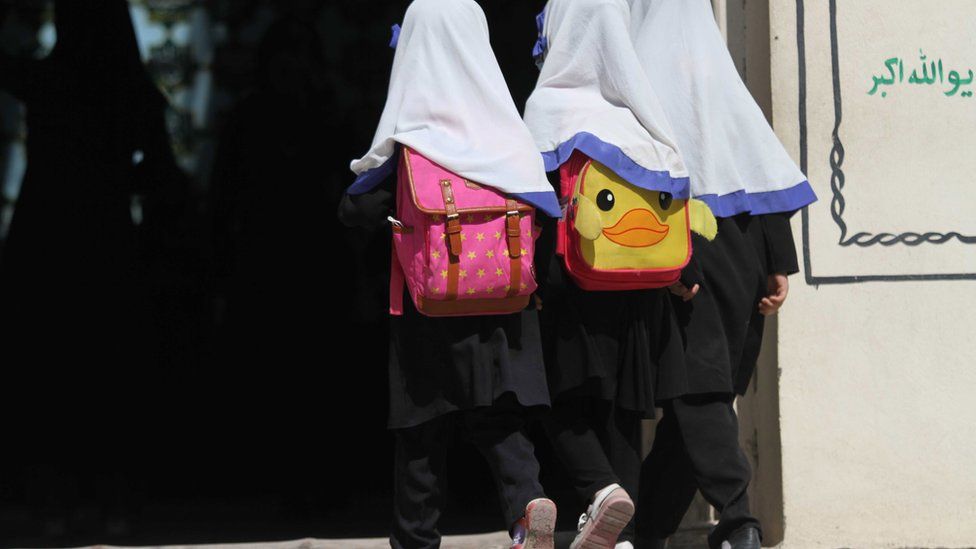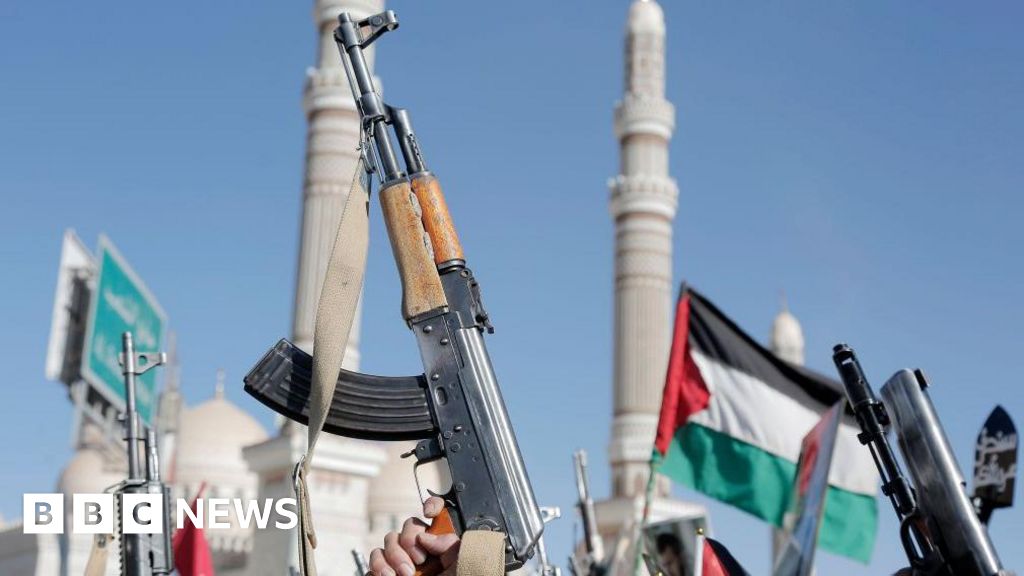ARTICLE AD BOX
 Image source, EPA
Image source, EPA
Education has become a dangerous pursuit for women in Taliban-ruled Afghanistan
By Yogita Limaye
South Asia Correspondent
On the morning of 30 September, 20-year-old Mariam was scrambling to get to the Kaaj education centre, in Kabul's Dasht-e-Barchi area, which is largely home to the city's ethnic Hazara minority.
Wahidah, her closest friend, had called her early that morning and said "Why are you still asleep? Wake up, we have the exam today." It was a practice test in preparation for Concor, a university entrance exam in Afghanistan.
While Mariam was on her way to the centre, Wahidah had called again to ask her to hurry, saying she'd kept a seat for her.
At 7:15am, Mariam had just arrived at the centre when she heard a string of gunfire.
"Then there was the most terrible explosion I've ever heard," she recalls. "I saw boys running out of the centre, jumping over its boundary wall. A few seconds later, I saw girls running out too. Many of them were injured, blood on their faces and clothes."
Mariam was not allowed into the centre but she refused to go home. She kept waiting for Wahidah to come outside.
Wahidah was among the 45 female students who were killed in the suicide attack at the private coaching institute on 30 September.
"She was like my sister. We shared all our secrets," Mariam says. "Wahidah didn't miss a single day of the preparatory course. Whether it rained or snowed or there was a flood, even though she lived farthest away from centre, she was always there."
On that Friday morning, Wahidah's father Mohammad Amir Hyderi had left to go to his shop early.
"I didn't even see her that day," he says. "She was the hero of our family, my angel. She always excelled at school. And even in a practice exam last month, she was the top scorer among 650 students. But it wasn't just that she was clever. She was so well-behaved and devout that everyone in our community loved her. I don't know why God chose me to be her father, but then why did he take her away so soon?"
For hours after the explosion, Mohammad and Mariam went to several hospitals looking for Wahidah.
"The Taliban were not letting us in. Finally at the Ali Jinnah hospital, Mariam slipped inside," Mohammad says, weeping as he recalled that day.
"She came out crying and screaming a few minutes later, saying she'd seen Wahidah's body."
Wahidah was a top student, her father says
As Afghanistan's economy crumbles, it's difficult for Mohammad to pay for private lessons, especially through his meagre earnings selling vegetables.
"I would save wherever I could. I'd buy less food and go without some things to pay for Wahidah and my other children's education," he said.
Since the Taliban seized power last August, girls have been barred from going to secondary school in most of Afghanistan, including Kabul. Wahidah had finished secondary school last year, but was worried about her younger sisters' education.
"She had started teaching her sisters all the subjects taught at school," Mohammad says.
With restrictions on the rights and freedoms of women increasing under the Taliban, it has been a time of despair for millions of young women and girls in the country.
"Whenever I used to feel hopeless or couldn't find the motivation to study, I would end up missing classes. Wahidah would say to me, 'I'll help you, don't worry, but please come for class,'" Mariam says.
For many girls who would have been in secondary school, the private education centre was a way out of the emptiness that filled their days.
Omulbanin Asghari, 17, dreamed of going to Harvard University to study political science or economics. Barred from school in her final year, she studied as much as she could at home, and also took courses at Kaaj.
"She wanted to make sure that she didn't miss out, and that her knowledge was at the level of a final year student," her brother Mukhtar Modabber said. "She used to read a lot. She was always surrounded by books. And she'd also exercise every day to keep fit."
Mukhtar was also Omulbanin's teacher. He has been teaching physics and mathematics at Kaaj centre for 10 years.
"Omul would always smile and joke with me and say 'Lala (brother), I'm going to go abroad and study, and then come back and work for the rights of women. You'll see - one day I'll be more famous than you,'" he says.
On 23 March, the Taliban had announced that secondary schools would reopen for girls. Omulbanin went to school, but she and her classmates were sent back in just an hour. The Taliban had rolled back their decision.
"It's the worst memory I have of her. I was the first person she called. She couldn't stop crying," Mukhtar said. "Since then she would get upset every morning when school would normally have started, and in the afternoon when it would have ended."
On the morning of the attack, Omulbanin was in a cheerful mood. "She was very happy. She had breakfast early, and left for the centre earlier than usual," Mukhtar said.
He was at home when he received a call from his younger brother, who also works at the centre. Mukhtar was told their sister had been injured. He ran to the centre where he found out that she had been killed.
Omulbanin,17, wanted to attend Harvard University
The youngest of five siblings, Omulbanin, Mukhtar says, was the most loved child of the family. "We are devastated. My mother has a heart ailment, and she's in a very bad condition since Omul died."
Afghanistan has seen numerous attacks on schools and places of education, in particular those dominated by the Hazara community. No group has so far claimed responsibility for last Friday's bombing, but the Islamic State Khorasan Province or ISKP - the regional affiliate of Islamic State - has claimed that it was behind earlier attacks.
"Each attack affects the morale of all students, but especially girls. It scares them, and us," Mukhtar said. "But despite the danger, I will continue teaching. The people behind this violence are scared that their future will be at risk if Afghanistan's younger generation is educated. This week, I've lost my sister and so many of my other students. But I have to remember that hundreds are still alive and want an education. I don't want their future to be dark."
Wahidah's father would often tell her to stop going attending classes at the centre because it was too dangerous. "She wouldn't say anything to me but she'd tell her mother that she wouldn't stop because she wanted to study medicine and serve her country," Mohammad said.
'I am just waiting for the centre to reopen and I will go back to my course. I used to need motivation to attend classes, but now it's a commitment and responsibility for me," Mariam says. "I have to continue my education, for Wahidah, for Nazanin, Shabnam, Nargis, for Samira, for tens of my friends who were killed. One day, we will win."
She isn't sure when that day will come or if it will happen in her lifetime but she is certain it will happen eventually: "Maybe more of us will be killed, but we will definitely win."

 2 years ago
24
2 years ago
24








 English (US) ·
English (US) ·